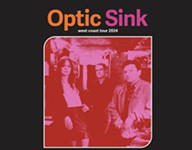Page Two
Editor Louis Black praises the Texas Film Commission's marriage of art and commerce, finds the Austin American-Statesman's coverage of George W. Bush's European trip untrustworthy, and urges readers to vote in our annual "Best of Austin" poll.
By Louis Black, Fri., June 15, 2001

Former commission location expert Brady Dial is showing us small-town downtowns and sprawling junior high schools. We will spend the afternoon driving around, scouting, and talking about movies.
This was only one of several scouts that Dial led Team Sayles on through Central Texas. Eventually the decision was made that the border is the border, and they shot Lone Star mostly out of Eagle Pass.
The day was typical of what the Film Commission does every day, but it indicates only part of the picture. The Film Commission staff is the unsung hero of Texas film, stepping in to help again and again. Facilitating not only every kind of production, they serve as a resource for dozens of different kinds of questions. As indicated that afternoon, they know and understand the state. Commission Director Tom Copeland is a personal hero of mine for his serious commitment to promoting Texas film and filmmaking. Copeland knows this state and works well with producers and directors to achieve their vision.
In this issue Marc Savlov does a fine job of detailing the rich history of the Film Commission. As first film commissioner Warren Skaaren knew, filmmaking is a business. The financial impact on the Texas economy over the past 30 years has been extraordinary. But film is also an art, and the Film Commission has helped to birth any number of great films, from The Getaway to Lone Star to some film shooting somewhere in the state today. Along the way they have helped shape this state as a home to serious independent filmmaking as well as a great host to national and international productions. Thirty years ago the commission started, and the evidence of their effectiveness is everywhere in Texas film.
I'm extremely curious about Bush's European trip, but went through a truly disquieting moment this morning. When I picked up the first section of the Austin American-Statesman, I realized that their coverage had become so aggressively pro-Bush that I no longer trusted what they had to say. Especially in a situation like this, where what is interesting is the European media spin and the tenor of the interactions. This is where I've come to trust the daily least, in its interpretations of this presidency. Almost like a state-controlled media organ, they seem determined to whitewash all of his actions, to always place him in the best light. I don't think I'm alone in this view; in fact, I might be rather late in coming to it. For the readers, a lack of trust in what the paper has to report as news, not editorializing, is chilling.
This might seem like a cheap shot by the weekly's editor, but longtime readers of this space know that, whereas we've been critical of the Statesman, we haven't harped on them.
This was my experience as a reader. Picking up the paper, starting to read, feeling a lack of faith in the news reporting I held in my hand. In the past I've thought they've been incomplete or hard to follow, but I've never not trusted them on national news in this way. It's not everything, but it is anything related to Bush. Whatever they say on the editorial page is completely legitimate, even if that conceptual comedian Marvin Olasky has worn out his welcome. What is on the news pages is the issue. And, I'm sorry, but I think it's tainted.
It's "Best Of Austin" time, so vote. Think about the ballot, think about local businesses, and think about what you do each day. Ideally, the "Best of Austin" should be a beautifully imagined Austin experience. You are the author of this vision. VOTE. ![]()








